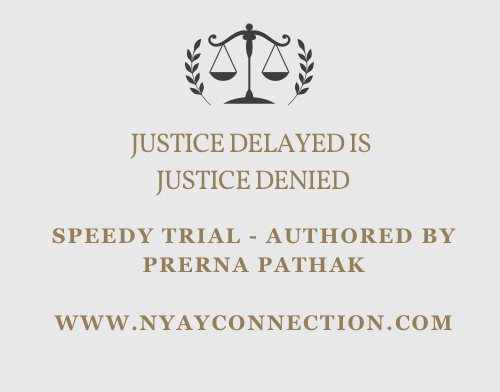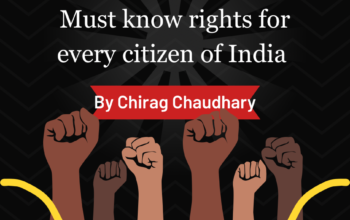Justice delayed is justice denied- William E. Gladstone
The Constitution of India guarantees the right to a speedy trial under Article 21 and the Supreme Court held in Hussainara Khatoon v. State of Bihar AIR 1979 SC 1369 that the right to speedy trial forms an essential ingredient of a just, fair, and reasonable procedure and is inherent to personal liberty of every individual. The basic idea underlying this right is that the cases should be decided as early as possible to prevent any miscarriage of justice but, it must be balanced against the adverse outcomes of a haste trial so that justice is not overlooked.
The modern concept of the speedy trial was developed by the United State of America. In India there are several statutes that provide for a time period within which the trial must be concluded, however, it must be borne in mind that the right to a speedy trial is far more subjective than other constitutional rights guaranteed to accused persons, and it cannot be quantified in a specific number of days or months, nor can it be pinpointed what point in the judicial process the right must be asserted or considered waived.
The delay in justice is inarguably far more severe in criminal cases as compared to civil cases. A procedure that does not provide for trial and disposal within a reasonable time frame cannot be considered just, fair, or reasonable. The right to a speedy trial is at the heart of criminal justice, and it goes without saying that inordinate delay results in a miscarriage of justice. The infamous Hussainara Khatoon Case where a writ of habeas corpus was filed for a large number of undertrials who were languishing behind bars for years for offences which even if proven, would warrant a few months of punishment. The mere idea of being locked up in a prison is frightening, imagine being locked up for a crime one did not commit. This is a serious violation of an individual’s human rights. However, a haste trial that overlooks the rights of the victims is just as unfair, thus there needs to be a balance between the two ensuring that no one suffers and justice prevails.
The court ruled in Sunil Batra v. Delhi Administration 1980 AIR 1579 that putting undertrials in detention with offenders violated the rationality and justice tests in Articles 19 and 21. In a landmark judgment, Justice Krishna Iyer stated that the physical and mental integrity of the prisoner is a vital right that must be protected from all forms of atrocities.
A seven-judge constitutional bench P. Ramachandra Rao v. State of Karnataka held that
“The mental agony, expense and strain which a person proceeded against in criminal law has to undergo and which, coupled with delay, may result in impairing the capability or ability of the accused to defend himself have persuaded the constitutional courts of the country in holding the right to speedy trial a manifestation of fair, just and reasonable procedure enshrined in Article 21.”
RIGHT TO A SPEEDY TRIAL WITH RESPECT TO THE MERCY PETITIONS OF DEATH ROW INMATES
In Maneka Gandhi v. Union of India AIR 1978 SC 579, the Supreme Court held that the procedure under which a person may be deprived of his life or liberty should be just, fair, and reasonable. The question arises whether this right to a speedy trial is inherent to death row convicts as a part of their personal liberty. An assumption can be safely made that any person who has been handed a death sentence has gone through a just, fair, and reasonable procedure however, the problem arises as to whether the execution of the sentence is just, fair, and reasonable.
In T.V. Vatheeswaran v. State of Tamil Nadu AIR 1983 SC 361 where the sentence of death was not carried out for 8 years and the convict was kept in solitary confinement. The Supreme Court held that the prolonged delay in the execution of the death sentence was indeed unjust, unfair, and unreasonable and the delay is a deprivation of personal liberty. The Court further held that if the execution of the death sentence is delayed by more than 2 years, it would effectively quash the death sentence and substitute it for life imprisonment. However, this rule of 2 years was overruled in the case of Sher Singh v. State of Punjab AIR 1983 SC 465
In Devender Pal Singh Bhullar v. State of N.C.T. of Delhi AIR 2013 SC 1975 the mercy petition for commutation of the death sentence to life imprisonment was rejected by the President under Article 72 of the Constitution. This was challenged and the primary question before the court was whether the power of judicial review can be exercised on account of delay in the judicial process. The court held that several factors have to be taken into account before a punishment is given for murder or similar crimes, such as the nature of the crime, the gravity of the offence, the impact of the offence on society, etc. If the crime is committed in such a gruesome and dastardly manner that it collectively shakes the conscience of the society such a gruesome and dastardly manner that it collectively shakes the conscience of society, the death penalty can be awarded by the court. Hence, the exercise of power by the President or Governor in refusing to accept a mercy petition in such instances could not be described as arbitrary or unjustified. Lastly, the court ruled that it could not utilise its judicial review power only on the basis of undue delay.
Further in Shatrughan Chauhan v. Union of India MANU/SC/0043/2014 where the death penalty of the accused was converted to life imprisonment on account of inordinate delay by the executive, which the court termed as a violation of fundamental rights and amounts to denial of justice and death sentence is not executable.
After this case, the commutation of the death sentence to life imprisonment on account of delay became a usual practice. The lack of a defined time period which would amount to delay has been used as a tool to file petitions for such commutations. This leads to the violation of the separation of power as it adds to the pressure on the judiciary to carry out the functions of the executive, where the judiciary is already suffering at the hands of case pendency. For the executive to exercise this power, Parliament must formulate competent procedural law that provides a sufficient framework so that mercy petitions may be determined on time and convicted persons can receive their dues on time, or else they will be mentally tortured by the prospect of death.
The right to a speedy trial exists at all stages investigation, inquiry, trial, appeal, revision, and retrial. In its many decisions, the Supreme Court has emphasized that a person may seek the Supreme Court under Article 32 and the High Court under Article 226 to assert the right to a quick trial. The right to a speedy trial should not bury the cause of justice. Thus, it is important as well as necessary to maintain a reasonable balance between the considerations of speed and justice. Justice’s primary characteristic is equality. There is no justice without equality. Justice is worth seeking because it is delivered with equality. As a result, this factor must never be compromised.
This article is written by Prerna Pathak. Prerna is pursuing her L.L.M. from Jamia Millia Islamia.
If you are a law student or professional and want to contribute to this website, send your submission at nyayconnection@gmail.com.




